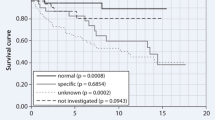Summary
Objectives
Though cardiac troponin-T may be positive in hypertrophic and dilative cardiomyopathy, it is not known how often troponin-T is positive in left ventricular hypertrabeculation/ noncompaction (LVHT), an unclassified cardiomyopathy. This retrospective study aimed to assess how often troponin-T is positive in LVHT, is associated with elevated CK, is attributable to cardiac or extra-cardiac causes, in particular neuromuscular disorders (NMDs), or if it is a predictor of poor survival.
Results
Among 100 patients, detected over a period of 11 years, troponin-T was determined at least once in 71 (71%) of them. Troponin-T was determined once in 36 patients, twice in 8 cases, three times in 11 patients, and more than three times in 16 cases. Troponin- T was positive at least once in 12 patients (17%). Forty-five of the 71 patients suffered from a NMD (63%). Troponin-T positivity was associated with elevated CK in 6 cases. Troponin-T-positivity was attributable to acute myocardial ischemia in a single case, to chronic renal failure in 5 cases, to dilative cardiomyopathy in 4 cases, to atrial fibrillation in 3 cases, to heart failure in 4 cases, and to NMD in 10 cases. Troponin-T positivity in LVHT patients with NMD was assumed to be due to cardiac involvement in the disease. Among the 22 patients who died during the observational period troponin was determined in 16 and was positive in 4 (25%).
Conclusions
Troponin-T is positive in 17% of the patients with LVHT. Most of these patients suffer from a NMD. Troponin-T positivity in LVHT predicts the presence of NMD and poor survival.
Similar content being viewed by others
References
Hamilton JS, Sharpe PC (2005) Two cases of inflammatory muscle disease presenting with raised serum concentrations of troponin-T. J Clin Pathol 58:1323–1324
Erlacher P, Lercher A, Falkensammer J, Nassonov EL, Samsonov MI, Shtutman VZ, Puschendorf B, Mair J (2001) Cardiac troponin and betatype myosin heavy chain concentrations in patients with polymyositis or dermatomyositis. Clin Chim Acta 306:27–33
Kobayashi S, Tanaka M, Tamura N, Hashimoto H, Hirose S (1992) Serum cardiac troponin-T in polymyositis/ dermatomyositis. Lancet 340:726
Schwarzmeier JD, Hamwi A, Preisel M, Resl C, Preusser M, Sluga E, Horcher E, Shehata MM (2005) Positive troponin-T without cardiac involvement in inclusion body myositis. Hum Pathol 36:917–921
White GH, Tideman PA (2001) Increased troponin-T in a patient with dermatomyositis. Clin Chem 47:1130– 1131
Jeremias A, Gibson CM (2005) Narrative review: alternative causes for elevated cardiac troponin levels when acute coronary syndromes are excluded. Ann Intern Med 142:786–791
Higgins JP, Higgins JA (2003) Elevation of cardiac troponin I indicates more than myocardial ischemia. Clin Invest Med 26:133–147
Jossi S, Gordon SL, Legge MA, Armstrong GP (2006) All troponins are not created equal. Intern Med J 36:325–327
Athanasiadis A, Vogelsberg H, Hauer B, Meinhardt G, Hill S, Sechtem U (2006) Transient left ventricular dysfunction with apical ballooning (tako-tsubo cardiomyopathy) in Germany. Clin Res Cardiol 95:321–328
Sato Y, Taniguchi R, Yamada T, Matsumori A (2003) Measurements of serum cardiac troponin-T in patients with heart failure. Am Heart J 145:e18
Mahajan N, Mehta Y, Rose M, Shani J, Lichstein E (2005) Elevated troponin level is not synonymous with myocardial infarction. Int J Cardiol 111:442–449
Sutidze M, Sulakvelidze M, Kochiashvili D, Labadze D, Rukhadze I (2006) Creatine kinase mb, cardiac troponin-T and cardiac troponin-I as the markers of rhabdomyolysis in chronic hemodialysis patients. Georgian Med News 132:68–71
Hoogerwaard EM, Schouten Y, van der Kooi AJ, Gorgels JP, de Visser M, Sanders GT (2001) Troponin-T and troponin-I in carriers of Duchenne and Becker muscular dystrophy with cardiac involvement. Clin Chem 47:962–693
Prellwitz W, Hafner G, Rupprecht HJ, Meyer J (1996) Diagnostic and differential diagnostic value of troponins, Med Klin (Munich) 91:336–342
Messner B, Baum H, Fischer P, Quasthoff S, Neumeier D (2000) Expression of messenger RNA of the cardiac isoforms of troponin-T and I in myopathic skeletal muscle. Am J Clin Pathol 114:544–549
Hammerer-Lercher A, Erlacher P, Bittner R, Korinthenberg R, Skladal D, Sorichter S, Sperl W, Puschendorf B, Mair J (2001) Clinical and experimental results on cardiac troponin expression in Duchenne muscular dystrophy. Clin Chem 47:451–458
Ricchiuti V, Apple FS (1999) RNA expression of cardiac troponin-T isoforms in diseased human skeletal muscle. Clin Chem 45:2129–2135
Mair J (1997) Cardiac troponin-I and troponin-T: are enzymes still relevant as cardiac markers? Clin Chim Acta 257:99–115
Tung P, Kopelnik A, Banki N, Ong K, Ko N, Lawton MT, Gress D, Drew B, Foster E, ParmleyW, Zaroff J (2004) Predictors of neurocardiogenic injury after subarachnoid hemorrhage. Stroke 35:548–551
Author information
Authors and Affiliations
Corresponding author
Rights and permissions
About this article
Cite this article
Finsterer, J., Stöllberger, C. & Krugluger, W. Positive troponin-T in noncompaction is associated with neuromuscular disorders and poor outcome. Clin Res Cardiol 96, 109–113 (2007). https://doi.org/10.1007/s00392-006-0467-7
Received:
Accepted:
Published:
Issue Date:
DOI: https://doi.org/10.1007/s00392-006-0467-7




